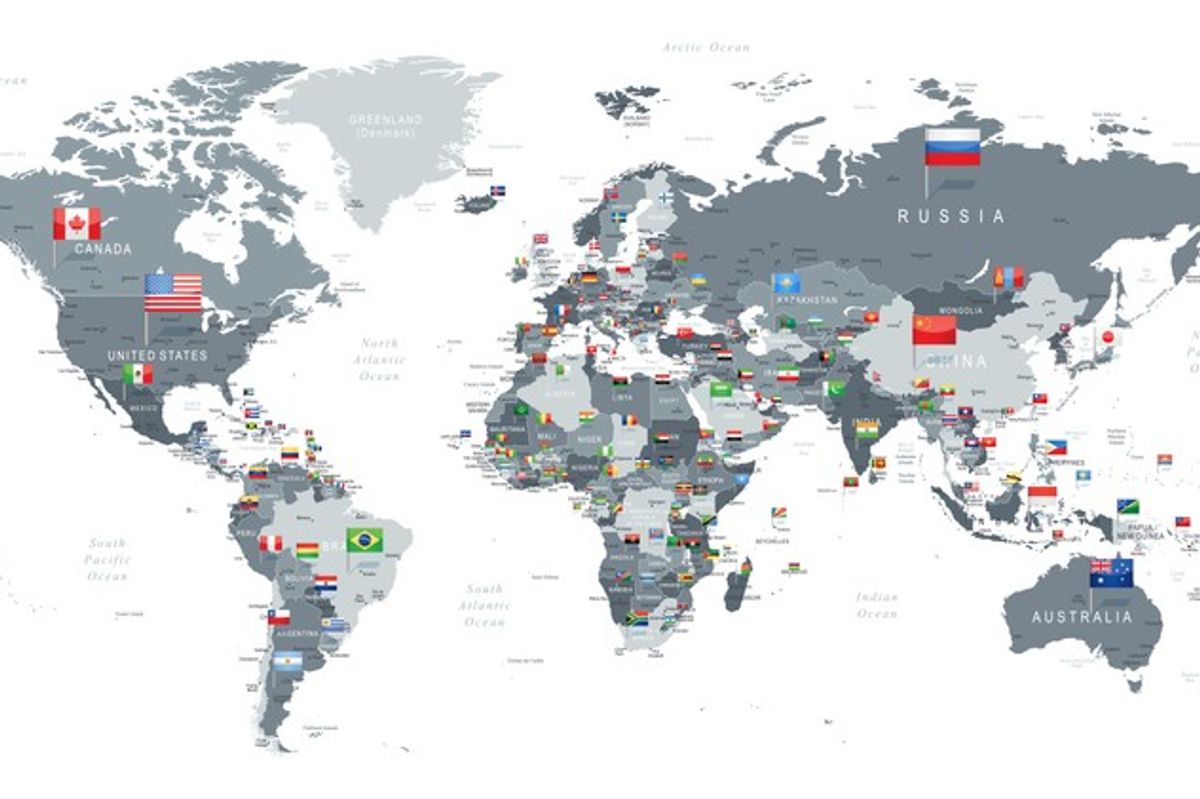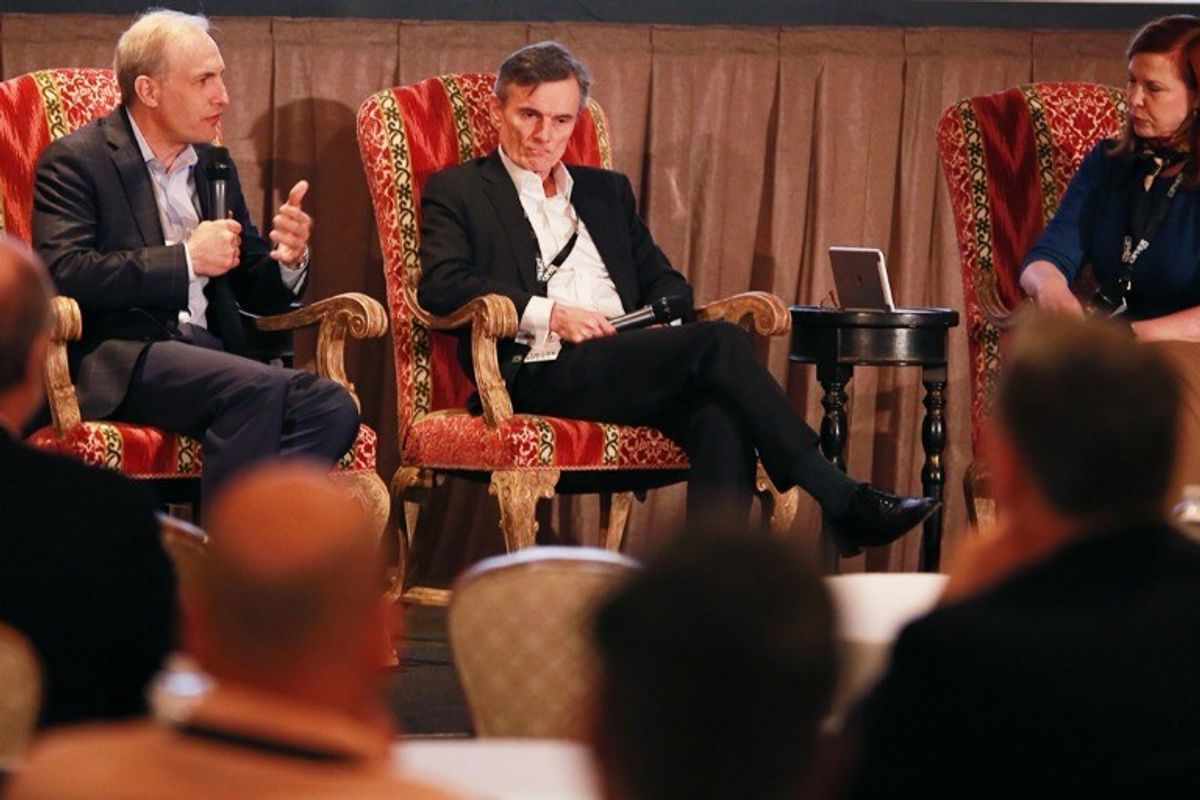Markets around the world continue to feel the pain of last Thursday’s Brexit referendum. The FTSE 100 (London’s Stock Exchange with the highest market capitalization) fell another 2.55 percent yesterday. The pound hit a 31-year low against the dollar, although it edged a bit higher this morning. Two credit agencies, including Standard & Poor’s, cut Britain’s AAA credit rating to AA, with a negative outlook. This comes despite Chancellor of the Exchequer George Osborne’s attempt to sooth investor concerns in a speech Monday morning.
In the U.S., the Dow and S&P 500 fell back into negative territory, and global U.S. banks seem to be taking a hit in the face of uncertainty. Bank of America shares were down six percent on Monday, and Goldman Sachs and JPMorgan Chase shares were both down two percent.
European leaders are now trying to navigate uncharted waters. European Commission President Jean-Claude Juncker spoke this morning at a special session of the European Parliament in Brussels on the Brexit vote, saying the British government must “clarify” its position. The situation heated up when Nigel Farage, the head of the UK Independence Party (UKIP) and a key "leave” campaigner gave a speech, telling the parliament they are in denial. “We now offer a beacon of hope to democrats across the European continent,” he said. “The UK will not be the last member state to leave the EU."
Later today, an EU leaders’ summit kicks off in Brussels. British Prime Minister David Cameron – who announced he is stepping down by October – will brief other EU leaders but will reportedly not attend a Wednesday morning meeting on the UK’s exit process under Article 50 of the Lisbon Treaty.
Delay or fast-track Brexit?
European leaders are divided on the speed of a Brexit. In an address to the House of Commons yesterday, Cameron said Britain will not launch formal proceedings to leave the EU at this stage. “Before we do that we need to determine the kind of relationship we want with the EU. And that is rightly something for the next Prime Minister and their Cabinet to decide,” he said.
Cameron also announced the creation of a new governmental unit devoted to figuring out the new UK-EU relationship in preparation for exit negotiations. “This will bring together officials and policy expertise from across the Cabinet Office, Treasury, Foreign Office and Business Department,” Cameron stated.
German Chancellor Angela Merkel seems supportive of the delaying tactic, in order to ensure rational decisions. “The negotiations must take place in a businesslike, good climate,” she said over the weekend. Merkel has ruled out informal talks with the UK about future relations until London begins the formal exiting process, by triggering Article 50.
Yet others are demanding a swifter exit. German Foreign Minister Frank-Walter Steinmeier said, "This process should get under way as soon as possible so that we are not left in limbo but rather can concentrate on the future of Europe." French Foreign Minister Jean-Marc Ayrault and European Commission President Jean-Claude Junker have made similar comments expressing the need for urgency.
In London yesterday, U.S. Secretary of State John Kerry urged EU leaders to stay calm and not “lose their heads” and take revenge on Britain for its vote to leave.
Reversing course
However, there is still the off chance that Britain does not end up leaving the EU. Nick Fishwick, a former senior member of the British Foreign Office and Cipher Brief network member, explains, “Most British lawmakers (MPs) do not want to leave the EU. There is a growing crisis across British politics that makes Parliament's behavior difficult to predict. Prime Minister David Cameron is resigning: the favorite to succeed him, Boris Johnson, is not popular with Conservative MPs, and he may struggle to command a majority in Parliament. All of which could lead to an early general election and throw the Brexit issue up into the air again.”
The opposition Labour Party is experiencing a crisis all its own. The party will move forward with a no confidence vote in parliament on party leader Jeremy Corbyn, after more than half of his Cabinet resigned in protest to his leadership. It is conceivable, although highly unlikely, that a new pro-EU Labour Party leader is elected and then wins a general election after Cameron steps down.
If this happens, there is nothing that legally says the new prime minister must listen to last week’s referendum results and invoke Article 50.
Moreover, a petition for a second referendum has garnered more than three million signatures from around the world, although a Cameron spokesperson said another vote is “not remotely on the cards.”
The Scottish component adds more uncertainty to the mix. Scottish First Minister Nicola Sturgeon has said the Scottish parliament could move to prevent a Brexit. There’s also the possibility Britain could work out some kind of associated status, in which the UK is outside of the EU, but Scotland retains freedom of movement and other EU benefits.
Future of European security
Still, EU leaders at today’s summit will be discussing and planning for a post-Britain EU. One major area of focus will be European security and defense. The EU representative for foreign affairs and security policy, Federica Mogherini, is expected to present a plan today that will broaden European cooperation in this realm and enhance Europe’s capabilities to act independently.
However, Mogherini is expected to state that NATO will remain the primary defense framework for most member states, the Wall Street Journal reports.
At an Atlantic Council event in Washington yesterday, Ambassador Nicholas Burns, former Undersecretary of State for Political Affairs and U.S. Ambassador to NATO, commented that a Brexit could actually provide an opportunity for the U.S. to show commitment to the North Atlantic alliance and the UK’s role in global security, while also supporting a stronger Germany within both NATO and the EU.
Former National Security Advisor and Supreme Allied Commander Europe of NATO General James Jones, speaking at the same event, said Britain’s important role in NATO will continue and may even grow with a Brexit.
“In terms of the UK’s international posture, a continuation of something close to the status quo is not unimaginable,” Nigel Inkster told The Cipher Brief. But Inkster, who served for more than 30 years in the British Secret Intelligence Service, puts all of these recent events in a broader and longer term context. “Historians may well look back at Brexit as an inflection point that marked the beginning of the end of a western-dominated world order,” he says.
Kaitlin Lavinder is an international producer at The Cipher Brief.














